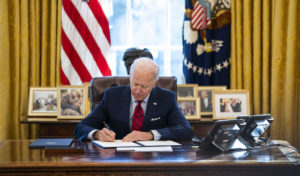
The Supreme Court is poised to overrule Roe v. Wade, upheld religious speech at government buildings, and more . . .
IN THE NEWS
- The U.S. Supreme Court has drafted an opinion in Dobbs v. Jackson Women’s Health Organization that, if published, will eviscerate women’s constitutional right to abortion by overturning Roe v. Wade and Planned Parenthood v. Casey. In the draft majority opinion, Justice Samuel Alito reasons that the Constitution does not protect the right to abortion, as it is not explicitly mentioned in the document nor is it “deeply rooted in this Nation’s history and tradition.” The draft opinion would allow states to pass laws banning or restricting access to abortion for almost any reason. If the draft opinion is published, 26 states are likely to pass laws that would ban or significantly curtail access to abortion in those states. Legal experts worry that this decision could put other constitutional rights, such as same-sex marriage, interracial marriage, and contraceptive use in jeopardy because none of these were protected rights at the time of the nation’s founding.
- The Supreme Court held that the city of Boston’s refusal to fly a religious group’s flag outside its city hall violated the group’s freedom of speech. Boston had denied the request to fly the flag to avoid violating the Establishment Clause of the First Amendment, which prohibits the government from promoting any particular religion. City officials worried that flying the flag implicated Establishment Clause concerns because the flag “promot[ed] a specific religion.” But the Court found that raising the flag did not constitute government speech. Rather, the Court held that Boston had denied the religious group’s speech, which amounted to discrimination.
- The U.S. Department of Justice announced a new environmental justice enforcement strategy and the new Office of Environmental Justice within the department. The strategy provides a roadmap for the new office to enforce federal environmental law and remedy environmental violations, contaminations, and injuries to natural resources. U.S. Attorney General Merrick Garland said that the office would serve as a “central hub” to address “communities most overburdened by environmental harm,” including “communities of color, indigenous communities, and low-income communities.”
- The National Highway Traffic Safety Administration issued a final rule that will require new vehicles sold in the United States to average at least 49 miles per gallon, beginning in 2026. The rule follows an executive order by President Joseph R. Biden to “establish ambitious, job-creating fuel economy standards.” In response to the rulemaking, U.S. Department of Transportation Secretary Pete Buttigieg said that the rule would decrease the United States’ vulnerability to “global shifts in the price of oil” and “reduce carbon emissions by 2.5 billion metric tons.”
- The Food and Drug Administration (FDA) announced that it would hold listening sessions to discuss two recently proposed regulations involving tobacco product standards. The proposed regulations would prohibit certain flavors in cigarettes and cigars that appeal to “youth and young adults.” In its announcement, FDA stated that there are “over 18.5 million menthol cigarette smokers ages 12 and over” in the United States, in addition to “over a half million users of flavored cigars.” The agency has scheduled the listening sessions for June 13 and June 15, and FDA will post registration information to attend on its website “in the coming weeks.”
- California Governor Gavin Newsom signed an executive order ordering the state to create a regulatory approach for blockchain and cryptocurrency companies. The order outlined priorities including transparency and consistency with federal laws, collecting feedback from various stakeholders, and exploring opportunities to use blockchain in public service applications. Newsom noted that governments are often behind on regulating new technology and said the order was “laying the foundation to allow for consumers and business to thrive.”
WHAT WE’RE READING THIS WEEK
- In an article in the Virginia Journal of Law & Technology, Lindsay Sain Jones, professor at University of Georgia’s Terry College of Business, argues that the U.S. Securities and Exchange Commission’s (SEC) traditional test for determining whether a transaction qualifies as a security—the Howey test—is problematic for cryptocurrencies. Under the Howey test, a transaction qualifies as a security if a person invests money into an enterprise with the expectation of profiting from the efforts of others. But Jones suggests that, if the Howey test is applied consistently, all cryptocurrencies would qualify as securities. As a result, cryptocurrency developers would have to file extensive documentation and disclosure with the SEC, resulting in hefty compliance costs, Jones warns. Rather, Jones advocates that the U.S. Congress act to declare cryptocurrencies expressly not securities.
- In an article in the Utah Law Review, Annie Brett, professor of law at University of Florida Levin College of Law, argues that environmental law has reached a new information age. Despite this newfound achievement, Brett suggests that systemic challenges prevent regulators and other stakeholders from using this data to enhance decision-making. Rather, regulators monopolize data collected and housed by the federal government, which impedes effective environmental management. Brett proposes that the U.S. Environmental Protection Agency and the National Oceanic and Atmospheric Administration each create an office “devoted solely to data assimilation, storage, and dissemination.” Moreover, she argues that these offices should expand access to environmental data to all stakeholders.
- In an article in the Indiana Law Journal, Emily Cauble, professor of law at DePaul College of Law, scrutinizes the Internal Revenue Service’s (IRS) refusal to issue private letter rulings—written determinations sent in response to taxpayers’ requests for guidance—for certain topics. Although private letter rulings afford taxpayers a sense of certainty for difficult tax questions, the IRS currently refuses to issue private letter rulings on 141 topics, according to Cauble. She considers eight potential rationales for the IRS’s refusal, including the rationale that some topics may require too much time for the agency to analyze. Nonetheless, she contends that none of the rationales she reviewed justify a blanket policy against private letter rulings on some topics.
EDITOR’S CHOICE
- In an essay in The Regulatory Review, Carrie N. Baker, gender and reproductive justice professor at Smith College, explained a Supreme Court ruling restricting access to medication abortion via telemedicine. Baker explained that the Court’s conservative members voted to reinstate the in-person portion of a drug safety program that was lifted during the COVID-19 pandemic, despite the proven safety and efficacy of prescribing these medications by telemedicine. Baker concluded that, although 19 states require medication abortions to be administered in person, lifting the restriction would increase safe access for many patients.



